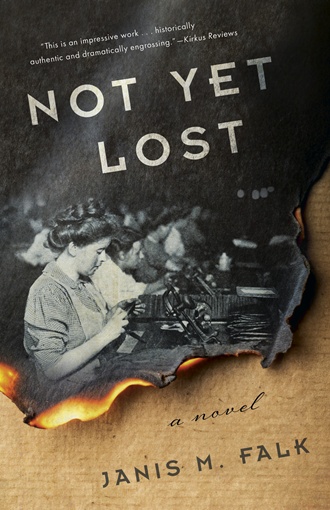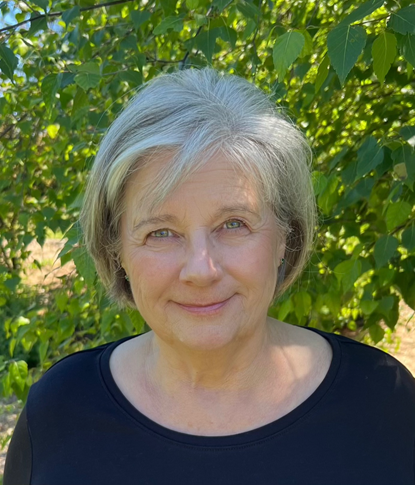While researching the Polish neighborhood of Detroit where my dad grew up—only after I discovered he was, in fact, Polish—I read a footnote that referenced Polish women striking in a cigar factory. I followed that lead.
Janis M. Falk – 13 September 2025
The Back Flap
In this gritty, cinematic story, hardworking Florence and her best friend, Basia, are enraged by the poor treatment, low wages, and unsafe working conditions they endure in the factory where they hand-roll cigars. Florence is as reserved and compliant as Basia is fiery and forthright.
During a time when their choices were between bad and worse, this is an underdog story of a woman who must search for her voice in order to lead a labor movement against her husband’s violent efforts to silence her.
Set in turbulent 1937 Detroit, this novel portrays the Eastern European immigrant struggle when difficult economic times, xenophobia, “Fordism,” secret societies, and Communist-led labor organizations buffeted the demographic.
Will Florence and her husband resolve their conflicts both inside and outside the home?
At what cost?
About the book
What is the book about?
Not Yet Lost is an underdog story of an immigrant woman who must search for her voice in order to lead a labor movement against her husband’s violent efforts to silence her. The novel combines historical fiction, labor rights activism, and family drama to tell the story of a Polish immigrant woman’s struggle for fair treatment in 1930s Detroit. Issues such as labor exploitation, ethnic discrimination, political extremism, and the challenges faced by working-class families are as relevant today as they were in the Great Depression.
When did you start writing the book?
About five years ago I became serious about the ideas rattling around in my head.
How long did it take you to write it?
A surprisingly short time, about three years, which, for a novel, is on the shorter end. My familiarity with the subject matter helped.
Where did you get the idea from?
My family’s origin story was murky at best. While researching the Polish neighborhood of Detroit where my dad grew up—only after I discovered he was, in fact, Polish—I read a footnote that referenced Polish women striking in a cigar factory. I followed that lead. When I mentioned it to my husband, he said his grandmother had worked in one of the cigar factories. Continuing the footnote hopscotch, I ran across Tom Stanton’s Terror in the City of Champions. While reading about the Black Legion vigilantes, I turned the page to see my uncle’s name mentioned! Thank goodness, he was only an uncle by marriage. My search became even more intriguing. I realized my dad probably changed his last name because it was the same as a prominent union organizer, who was persona non grata in Detroit. Even if it weren’t my family I was reading about, I was hooked. Then I decided to pit these two lesser-known social elements against each other, all under the watchful eye of Diego Rivera and his famous mural in the Detroit Institute of Art.
Were there any parts of the book where you struggled?
Balancing historical backstory with narrative flow always presents a challenge. My writers’ group kept my history lessons in check though. Also, a few items I assumed were common knowledge aren’t. For example, I thought everyone would know what a Bolshevik is without warranting an explanation. That’s not the case. Eastern European history is enigmatic for many, which was part of my motivation for writing the book.
What came easily?
The characters. I love the complexity of human beings. I try to understand, truly understand, what makes people behave the way they do. One person’s experience can seep through future generations. That’s true for Alex and Basia in particular, but actually for all my characters. Also, many details of Polish culture were at the ready because I know them firsthand.
Are your characters entirely fictitious or have you borrowed from real world people you know?
It’s a combo. Since the story is close to my family’s experience, I borrowed some people’s circumstances and personality traits, then fictionalized the characters from there. The characters are not biographical.
We all know how important it is for writers to read. Are there any particular authors that have influenced how you write and, if so, how have they influenced you?
I love epic, complicated novels. For contemporary authors, Abraham Verghese, The Covenant of Water, and Viet Thanh Nguyen, The Sympathizer, are two of my favorites. Both offer deep understanding of culture and history. Annie Proulx offers in Barkskins an epic I can only dream about achieving. I must give a nod to the Russian literary canon. All of these authors create worlds that are inhabitable in a way the reader experiences them, rather than reading about them. Their novels are like 3D puzzles, or chess games. A beauty exists in their construction and execution. I can only strive to write in their spirit.
Do you have a target reader?
Not Yet Lost would appeal to those who enjoy historical fiction, for sure, but also readers interested in social justice and immigrant experiences. The protagonist is a strong, female character and some have labeled the book women’s fiction. I have written the book in a wholistic way which includes a male perspective and the unique challenges they faced in the oppressive times.
About Writing
Do you have a writing process? If so, can you please describe it?
This questions a tough one because it’s really asking how my brain works. I’m not a very disciplined person and I eschew routine. I’m writing all the time in my head. One time I had a lot of pruning to do on our lavender plants on our farm. By the time I was finished, I had a whole chapter written. I came in and dumped it into the computer. The key is the characters. My family and I would sit around and talk about the characters as if they were alive. That’s a bit cliché but it’s true.
Do you outline? If so, do you do so extensively or just chapter headings and a couple of sentences?
No, I don’t outline. I wish I could, but the tyranny of the format is too oppressive. My stories grow organically. When I write the synopsis after the fact I identify structural issues. This approach probably isn’t the most efficient, but it works for me.
Do you edit as you go or wait until you’ve finished?
I am a member of a writers’ critique group, led by a professional. In that way, I edit as I go, and the direction of the story can change with that input. I found an arms-length developmental editor was productive once the manuscript was finished. As they say, you can’t see the forest… Even my critique group had become too immersed in the characters and the story to be objective. They already understood too much of what wasn’t on the page, so they didn’t notice what was missing.
Did you hire a professional editor?
I did and it proved productive in surprising ways. My writers’ group had become immersed in my story and the characters, so while still able to critique craft, the high-level view was lost. The professional editor, with whom I had zero relationship, identified holes where things in my head never appeared on the page. For example, I always knew Florence was an artist because her character was based on my grandmother. In an earlier draft, the reader didn’t learn that detail until well into the book.
Do you listen to music while you write? If yes, what gets the fingers tapping?
Just the music in my head! I’m very comfortable with silence.
About Publishing
Did you submit your work to Agents?
Yes, I submitted to about 25 agents. A few asked for the full manuscript, which was encouraging. One, actually provided feedback on the writing which launched another round of revisions.
What made you decide to go Indie, whether self-publishing or with an indie publisher? Was it a particular event or a gradual process?
One day I realized I was annoyed with people trying to make my book something it wasn’t intended to be. Everyone reads through their own filters of preferences and preconceived ideas of what the story “ought” to be. I wanted to tell the story I wanted to tell, so creative integrity and control were important to me. Also, after three years of working on it, I needed to keep the momentum going. I wasn’t willing to wait for slush piles to be cleared. The hybrid model offered a shorter timeline from acceptance to pub date.
Did you get your book cover professionally done or did you do it yourself?
She Writes Press includes cover design services in their package. Answers to a detailed questionnaire pointed the designers in the correct direction. I was offered five choices to start, but there was a clear winner. The designer clearly “heard” the tone of the book, and the final design integrates perfectly with the story. I love it!
Do you have a marketing plan for the book or are you just winging it?
I engaged a PR firm for pre-release marketing. With this being my debut novel, I thought it important to leverage professional experience and contacts. While they handle the push, I focus on the pull by visiting bookstores, word-of-mouth, and participation in book festivals.
Any advice that you would like to give to other newbies considering becoming Indie authors?
Focus on craft. Focus on craft. Focus on craft. I can’t say it enough. It’s easy to get star smacked by the idea of being published, but offering a good product is the key to success. Do your homework. Learn the industry and be professional. Prepare your manuscript meticulously.
About You
Where did you grow up?
The first half of my childhood I spent in suburban Detroit, east side, in a working-class neighborhood. The second half was spent in suburban Detroit, but on the west side. I love the gritty creativity of the city.
Where do you live now?
After some years in Chicago, we now live in northern Wisconsin where we run an organic farm.
What would you like readers to know about you?
My guilty pleasure is watching foreign language cop shows.
What are you working on now?
I’m currently writing a novel which spans three generations of Germans and Americans. The focus is on how the aftermath of war seeps through future generations. Think modern day Romeo and Juliet—star crossed lovers battling cross cultural baggage bequeathed by their parents and grandparents.
End of Interview:
Get your copy of Not Yet Lost from Amazon US.



